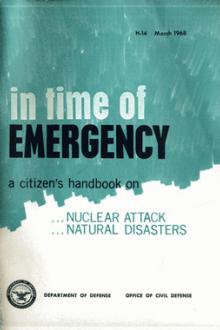Beautiful Things, Hunter Biden [good book recommendations .txt] 📗

- Author: Hunter Biden
Book online «Beautiful Things, Hunter Biden [good book recommendations .txt] 📗». Author Hunter Biden
I wasn’t thinking about any of that back then. Hours after Kathleen’s call, I started drinking secretly, though I backed off enough to prevent it from becoming a full-blown binge. My daughter Naomi’s birthday is on December 21, another day we usually spent at my parents’, and I couldn’t see her then, either; I’d already missed Finnegan’s and Maisy’s birthdays in August and September because I was in rehab.
Christmas followed in no time. The girls left with Kathleen. Mom and Dad flew to the Caribbean with Uncle Jimmy and Aunt Val, like they did every Christmas. Hallie and her kids headed to Florida with another family.
Beau was dead.
Alone, depressed, angry, my brain humming with an alcoholic’s illogic, I bought a bottle of vodka, retreated into my DC apartment, and drank. I did that practically every day, all day, from Christmas until the end of January.
I would turn on the TV, sit on the couch, drink, pass out. Even drunk—especially drunk—I never slept in my bed. I’d watch the TV nearly comatose, staring at it without really being aware of what was on. Other times, I’d cry for hours without realizing I was crying. I hardly ate.
I phoned it in at work, with the five employees in my office taking up the slack. I sat in on some conference calls, canceled meetings, didn’t go to the office. I scratched all business trips. The only calls I took were from my daughters and my dad, who called incessantly. He’d ask how I was. I’d say fine, hang up, pass out, wake up, drink more.
I would drink like that for twelve to sixteen hours. When I finished a bottle, I’d trek across the street to Logan Circle Liquor, a sagging storefront filled with racks of booze and a clerk who worked behind a bulletproof plastic window. I’d order a handle of Smirnoff vodka—about a half gallon—in a tremulous voice and pay for it with shaky hands. Usually I’d head straight home, but sometimes the block-long trip proved to be too much: somewhere between crossing the street and climbing the stairs to my apartment, I’d unscrew the cap and sneak a swig.
I wouldn’t realize that whole days, even weeks, had passed. Each one bled into the next, while simultaneously crawling by at a glacial pace. Before long I began to wake up with debilitating withdrawal symptoms. It became a chore just to raise my head off the pillow. If there wasn’t a last swig left in the bottle, it took a Herculean effort to put on my boots and jacket and stumble back to the liquor store. The short walk soon felt like a marathon; then, like I was crawling over broken glass.
I had never drunk like that before. I’d drunk to excess, to the point where I knew it was no longer smart to keep drinking—that’s how it was when I decided to get sober in 2003 and again in 2010. But I’d never been in such pain that I couldn’t go out, that I almost couldn’t go on. I lost twenty pounds. I didn’t eat anything much beyond what was available at the liquor store: Doritos, pork rinds, ramen noodles. Eventually my stomach couldn’t even handle the noodles.
I was drowning myself in alcohol.
I pulled out of the free fall just once. Three weeks in, unshaven and shedding weight, I saw on my calendar a commitment I’d made months earlier that I couldn’t back out of: a weeklong trip to the Middle East with a U.S. delegation for the World Food Program USA. It was too important; lives literally depended on it. So, as I’d done plenty of times before, I pulled out the drunk’s hole card and did what to others might seem impossible: transformed myself into a functional alcoholic. I showered, shaved, packed, and boarded a plane for Beirut.
Our first visit was to a refugee camp in Lebanon, next to the Syrian border. On the other side, 700 men, women, and children were stranded in a windswept no-man’s-land with barely any assistance. They were pleading to join the 80,000 other Syrians housed in Jordan’s Zaatari refugee camp, a teeming but well-organized shelter that we also would soon visit, talking with families housed in metal shipping crates that dotted a treeless, unpaved stretch of sand. Following those sojourns, I would head to Amman to lobby King Abdullah II, one-on-one, for their entry.
I’d been dropped into desperate spots around the world for the WFP many times before. Each left an indelible mark.
For instance, in December of 2013, I flew to the Philippines a month after it was lashed by Typhoon Haiyan, whose winds as high as 190 miles per hour wiped out whole swaths of the country. More than 6,000 people were killed and 4.1 million displaced. At the time, it was the largest typhoon in recorded history.
When we landed on the southernmost tip of Samar Island, in Guiuan, it looked as if someone had taken an industrial-sized scythe and cut every tree in half for as far as the eye could see. What Haiyan didn’t demolish, storm surge washed away. The town’s mayor, standing in an office with no walls and no roof, called the typhoon delubyo—Armageddon.
Yet those who survived were nothing short of astonishing. Throngs of kids swarmed us, so many of them smiling. A two-year-old clambered into my arms and wouldn’t let go, clinging to me as I toured the devastation. Everyone told survival stories: clutching a tree, hiding under a hut, carrying neighbors on their shoulders through rising floodwaters.
The WFP had mobilized pre-positioned food supplies within hours of the typhoon’s landfall—rice from Sri Lanka, high-energy biscuits from Bangladesh—and everyone we





Comments (0)